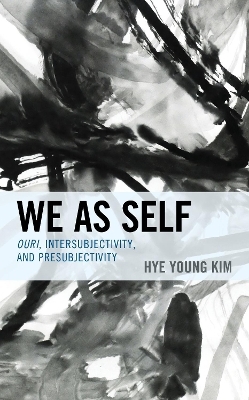
We as Self
Ouri, Intersubjectivity, and Presubjectivity
Seiten
2022
Lexington Books (Verlag)
978-1-4985-5467-1 (ISBN)
Lexington Books (Verlag)
978-1-4985-5467-1 (ISBN)
In our modern time of division, who belongs to the we is an important and underexamined area of philosophical investigation. This book offers another way of understanding we-ness by adopting diverse linguo-cultural traditions in a philosophical investigation of selfhood.
We as Self argues for a notion of we-ness based not on a self-centered or a self-less point of view, in which the “we” is only either a collection of individuals or an anonymous whole, but on “relation.” This relation is pre-subjective, meaning that the conscious, reflective, subjective self is not the conceptual basis of the relation. The irreducible metaphysical distinction between self and other is always there, but the awareness of it is not prior to this relation, which is an ontological pre-condition of self. Hye Young Kim demonstrates that the distinction and unity of self and other in this relation can be comprehended spatially by applying knot logic. The author analyzes certain linguistic practices in Korean to show one representation of pre-subjective we-ness in language, but not in an ethnographical manner. By doing so, the author criticizes and challenges the Eurocentric tendency of philosophy and contributes to efforts to expand diversity in philosophy.
We as Self argues for a notion of we-ness based not on a self-centered or a self-less point of view, in which the “we” is only either a collection of individuals or an anonymous whole, but on “relation.” This relation is pre-subjective, meaning that the conscious, reflective, subjective self is not the conceptual basis of the relation. The irreducible metaphysical distinction between self and other is always there, but the awareness of it is not prior to this relation, which is an ontological pre-condition of self. Hye Young Kim demonstrates that the distinction and unity of self and other in this relation can be comprehended spatially by applying knot logic. The author analyzes certain linguistic practices in Korean to show one representation of pre-subjective we-ness in language, but not in an ethnographical manner. By doing so, the author criticizes and challenges the Eurocentric tendency of philosophy and contributes to efforts to expand diversity in philosophy.
Hye Young Kim is an associate researcher at the Husserl Archive at l’Ecole Normale Supérieure, Paris.
Chapter 1: We in Korean? Why
Chapter 2: We in Korean
Chapter 3: Self in Korean
Chapter 4: Self as Subject
Chapter 5: Self in Pre-subjective Relation
Chapter 6: Self-in-Relation and Pre-subjective We: Mathematical Representation
Chapter 7: We in Diagrams
Chapter 8: Primacy of We?
Chapter 9: Notion of Relation
Chapter 10: Feelings and Corporeality
Chapter 11: Collective Memory: Boundary, Place, and Home
Chapter 12: Epilogue. Violence of the We
| Erscheinungsdatum | 16.01.2021 |
|---|---|
| Verlagsort | Lanham, MD |
| Sprache | englisch |
| Maße | 152 x 228 mm |
| Gewicht | 345 g |
| Themenwelt | Geisteswissenschaften ► Geschichte ► Regional- / Ländergeschichte |
| Geisteswissenschaften ► Philosophie ► Geschichte der Philosophie | |
| Geisteswissenschaften ► Philosophie ► Philosophie des Mittelalters | |
| Geisteswissenschaften ► Philosophie ► Philosophie der Neuzeit | |
| Geisteswissenschaften ► Philosophie ► Sprachphilosophie | |
| Geisteswissenschaften ► Religion / Theologie | |
| ISBN-10 | 1-4985-5467-9 / 1498554679 |
| ISBN-13 | 978-1-4985-5467-1 / 9781498554671 |
| Zustand | Neuware |
| Haben Sie eine Frage zum Produkt? |
Mehr entdecken
aus dem Bereich
aus dem Bereich
Erinnerungen
Buch | Softcover (2024)
Pantheon (Verlag)
CHF 22,40


